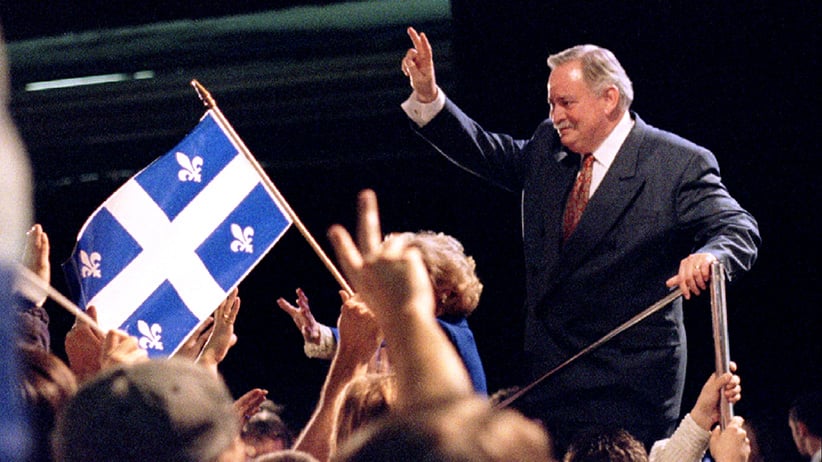Jacques Parizeau: the sovereignty movement’s poet
‘He was, finally, the only PQ strategist worth the name.’ Paul Wells on the movement’s clumsy and ardent heart
Share

Politics fabricates myths from notions that are not only false, but obviously false. Jacques Parizeau died and, once again, the news columns were calling him a stuffy, boring intellectual. Uncomfortable in his skin. Disdainful of mortals. Surrounded by fixers who wanted to humanize him and wept at the impossibility of the task.
It’s bollocks. Every CEGEP student in Quebec knew better. Whenever Parizeau visited a college campus, kids one-third his age would come flocking, beat their hands red applauding him and stay long after to argue the points he’d made. He was the sovereignty movement’s poet, its ungainly sentimentalist, its best ambassador to three generations of young Quebecers.
He married a novelist, and a good one, the Polish-born Alicja Poznańska. He retired to tend a vineyard. When his car got stuck in traffic in the early 1960s, he left it on the street and tore up his driver’s licence, never to drive again. He showed up on the MusiquePlus TV channel before the 1995 referendum, wearing a suit jacket with an incongruous silk foulard around his neck, because he apparently thought it made him look youthful. When one of the kids asked him about the value of travel, he got very excited, but he reminded his young audience: “Always make sure that, wherever you go, you keep in your heart a place called home.” I thought he might cry. I thought I might.
When he got his chance to make Quebec a country, he tabled a draft bill full of outrages against a Canadian Constitution he didn’t like much anyway, but the first page was blank. “It’s the preamble,” he said when he introduced it. “You’ll write it yourselves.” Province-wide consultations drummed up ideas that were fed to a drafting team of poets and actors. When their work was unveiled in Quebec City, Lucien Bouchard and the awkward third man in the Yes camp, Mario Dumont, skipped the ceremony. Greasy kid stuff, they thought. Silliness.
The text, read aloud on a theatre stage by solemn hams, confirmed the realists’ worst fear: It was ponderous hokum. “Winter is known to us. We know its frosts, its solitudes, its false eternity and its apparent deaths,” they intoned. Parizeau sat in the front row, weeping with joy.
So he was the Quebec sovereignty movement’s clumsy and ardent heart. He was also the pillar of its economic credibility, a former Bank of Canada official who converted to separatism on a Montreal-to-Banff train ride in 1967 and brought a transforming legitimacy to the upstart Parti Québécois when he joined it two years later. For the rest of his life, his endorsement would cement a PQ leader’s authority—and his criticism would mark the beginning of a leader’s end. Every PQ leader who wasn’t Parizeau would learn to despise him, because, even without a valid licence, Parizeau was the king of the backseat drivers.
When Lévesque wavered after the 1980 referendum, Parizeau led six other ministers out of the government, shattering Lévesque’s career. As late as 2011, four PQ members of the National Assembly left the party over a dodgy private member’s bill designed to grease the wheels of a business venture led by Pierre Karl Péladeau, who, at that point, was still just a businessman. All four rebel Péquistes were close Parizeau associates. One was his second wife, Lisette Lapointe. Parizeau was visiting the National Assembly when the revolt burst into the open. He really was incorrigible.
He was, finally, the only PQ strategist worth the name. He never stopped thinking about how to win, and not to win power, but a country. He knew a Yes majority in a secession referendum would be hard to get, and that it would mark only the beginning of the hard work of secession, not its end. He hatched an elaborate network of committees and working groups, most of them secret, to prepare. He knew international recognition for a seceding Quebec would not be merely ornamental, but crucial. He worked hard to prepare the diplomatic blitz that would have followed a Yes. Teams of Quebec public servants had tickets purchased for flights to foreign capitals the morning after the 1995 vote, flights they never took.
“Improvised politics is improvisation,” Parizeau told his biographer, Pierre Duchesne, in 2000. “So if you’re elected with a program, you carry it out. The polls say we’re losing, that we’re headed for a wall? Then we knock the wall down!” And Lucien Bouchard, the darling (for a time) of people who thought they knew what was important to the sovereignist movement? “Lucien Bouchard has the reflexes of a loser,” Parizeau said.
His speech on the night of the referendum was disgraceful. I’m glad he never won the fight that mattered most to him. But watching him in action was always fascinating. He was the sovereignty movement’s lion, its best mind. The sovereignty movement’s problem is not that he is gone, but that, in half a century of trying, they couldn’t produce another like him.